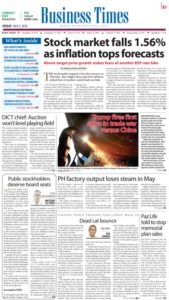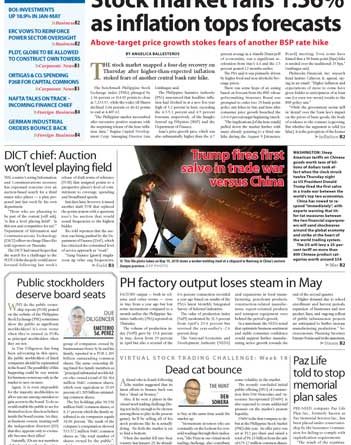BIZ-STOCKS EXCHANGE: MANILA – Stock market falls 1.56% as inflation tops forecasts
Above-target price growth stokes fears of another BSP rate hike
The stock market snapped a four-day recovery on Thursday after higher-than-expected inflation stoked fears of another central bank rate hike.
The benchmark Philippine Stock Exchange index (PSEi) plunged by 1.56 percent or 114.85 points to close at 7,233.57, while the wider All Shares declined 1.04 percent or 46.42 points to end at 4,407.62.
The Philippine Statistics Authority (PSA) announced that headline inflation had clocked in at a new five-year high of 5.2 percent in June, exceeding the 4.3-5.1 percent and 4.9 percent forecasts, respectively, of the Bangko Sentral ng Pilipinas (BSP) and the Department of Finance.
June’s price growth pace, which was also substantially higher than the 4.7 percent average in a Manila Times poll of economists, was a significant acceleration from May’s 4.6 and the 2.5 percent posted 12 months earlier.
The PSA said it was primarily driven by higher food and non-alcoholic beverage prices.
There was some hope of an easing based on forecast from the BSP, whose policymaking Monetary Board was prompted to order two 25-basis point policy rate hikes in May and June after consumer price growth breached the 2.0-4.0 percent target beginning March.
“The implications [of the June result]pulled down the market further with many already pointing to a third rate hike during the August 9 [Monetary Board] meeting. Even some have hinted that a 50-basis point (bps) hike is needed over the traditional 25 bps,” Limlingan said.
 Philstocks Financial, Inc. research head Justino Calaycay Jr. agreed, saying in an email: “Higher inflation and expectations of more to come have given fodder to anticipation of at least one (or even two more) tweaks to the BSP policy rate.”
Philstocks Financial, Inc. research head Justino Calaycay Jr. agreed, saying in an email: “Higher inflation and expectations of more to come have given fodder to anticipation of at least one (or even two more) tweaks to the BSP policy rate.”
“While the government seems still in ‘denial’ over the Train law’s impact on the prices of basic goods, the body of evidence to the contrary is growing. But whether the argument is valid (or false), it is the perception of the former that has lent apprehension to investors,” he added.
The Tax Reform for Acceleration and Inclusion law, implemented at the beginning of the year, raised taxes on a range of products and services such as alcoholic beverages, tobacco products, fuel and cars in exchange for lower personal income tax rates.
The resulting price rises, particularly for gasoline and diesel, have prompted some legislators to call for a full or partial repeal of the law, which the government claims is needed to prime its massive “Build Build Build” infrastructure program.”
Economic managers have repeatedly said that the Train’s law’s impact on inflation was well below one percentage point.
One factor that could have figured in Thursday’s sell-off was the United States’ scheduled enforcement of tariffs on Chinese goods beginning Friday, a development that led to declines for markets in the region.
Back in Manila, all sectoral indices registered losses, led by holding firms that fell by 2.09 percent.
Volume turnover remained thin with only 680 million issues valued at P5.2 billion traded.
Losers outmatched winners, 113 to 75, while 60 issues were unchang
BY ANGELICA BALLESTEROS, TMT ON
 All photographs, news, editorials, opinions, information, data, others have been taken from the Internet ..aseanews.net | [email protected] | For comments, Email to : Pahulu Gan – Contributor | [email protected]
All photographs, news, editorials, opinions, information, data, others have been taken from the Internet ..aseanews.net | [email protected] | For comments, Email to : Pahulu Gan – Contributor | [email protected]









